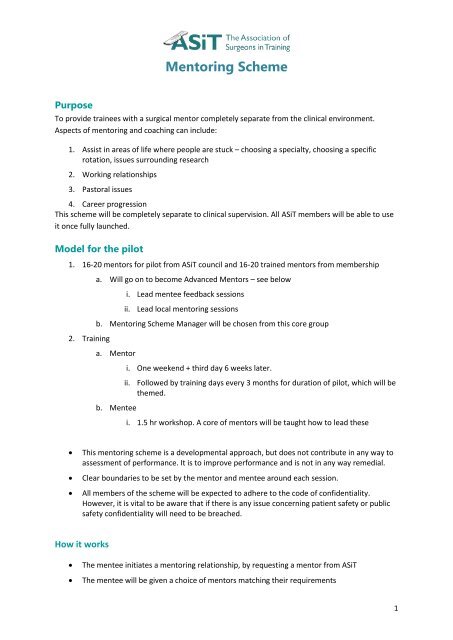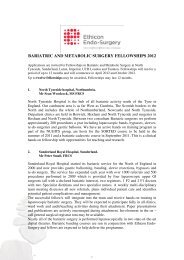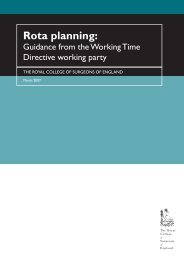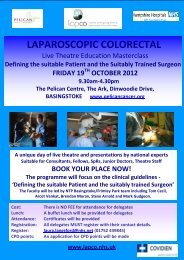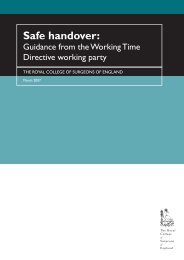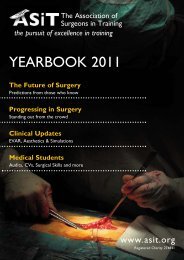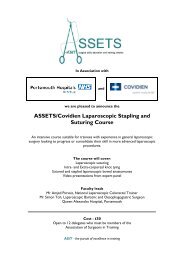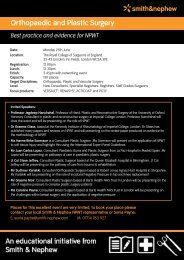Outline of ASiT Mentoring Scheme (PDF - 419.9 Kb)
Outline of ASiT Mentoring Scheme (PDF - 419.9 Kb)
Outline of ASiT Mentoring Scheme (PDF - 419.9 Kb)
Create successful ePaper yourself
Turn your PDF publications into a flip-book with our unique Google optimized e-Paper software.
<strong>Mentoring</strong> <strong>Scheme</strong><br />
Purpose<br />
To provide trainees with a surgical mentor completely separate from the clinical environment.<br />
Aspects <strong>of</strong> mentoring and coaching can include:<br />
1. Assist in areas <strong>of</strong> life where people are stuck – choosing a specialty, choosing a specific<br />
rotation, issues surrounding research<br />
2. Working relationships<br />
3. Pastoral issues<br />
4. Career progression<br />
This scheme will be completely separate to clinical supervision. All <strong>ASiT</strong> members will be able to use<br />
it once fully launched.<br />
Model for the pilot<br />
1. 16-20 mentors for pilot from <strong>ASiT</strong> council and 16-20 trained mentors from membership<br />
2. Training<br />
a. Will go on to become Advanced Mentors – see below<br />
i. Lead mentee feedback sessions<br />
ii. Lead local mentoring sessions<br />
b. <strong>Mentoring</strong> <strong>Scheme</strong> Manager will be chosen from this core group<br />
a. Mentor<br />
b. Mentee<br />
i. One weekend + third day 6 weeks later.<br />
ii. Followed by training days every 3 months for duration <strong>of</strong> pilot, which will be<br />
themed.<br />
i. 1.5 hr workshop. A core <strong>of</strong> mentors will be taught how to lead these<br />
<br />
<br />
<br />
This mentoring scheme is a developmental approach, but does not contribute in any way to<br />
assessment <strong>of</strong> performance. It is to improve performance and is not in any way remedial.<br />
Clear boundaries to be set by the mentor and mentee around each session.<br />
All members <strong>of</strong> the scheme will be expected to adhere to the code <strong>of</strong> confidentiality.<br />
However, it is vital to be aware that if there is any issue concerning patient safety or public<br />
safety confidentiality will need to be breached.<br />
How it works<br />
<br />
<br />
The mentee initiates a mentoring relationship, by requesting a mentor from <strong>ASiT</strong><br />
The mentee will be given a choice <strong>of</strong> mentors matching their requirements<br />
1
<strong>Mentoring</strong> <strong>Scheme</strong><br />
Once the mentee has chosen a mentor, together they will decide<br />
o Topics to be covered<br />
o How long sessions last<br />
o How many sessions there are likely to be and spread over how long<br />
The mentoring scheme manager or lead<br />
Initially the Director <strong>of</strong> Education will be the senior point <strong>of</strong> contact. After the pilot year, the lead will<br />
be elected/ appointed from the core <strong>of</strong> advanced mentors.<br />
The lead will need to be a person who is genuinely interested in and committed to mentoring and<br />
who themselves has preferably trained in and practised mentoring. There is substantial admin<br />
required and we may require an additional member to take on the role <strong>of</strong> administrator.<br />
In an effective mentoring scheme, this person:<br />
<br />
<br />
<br />
<br />
<br />
<br />
<br />
<br />
takes a lead on developing and promoting the mentoring scheme within the wider<br />
community<br />
ensures that up-to-date information is available (on paper, electronically or online as<br />
appropriate)<br />
is the first point <strong>of</strong> contact for any enquiries from sponsors, mentors or mentees<br />
has the role <strong>of</strong> matching mentees to mentors<br />
arranges briefings for potential mentees and sponsoring managers as appropriate<br />
ensures mentors are adequately trained, that there is some assessment or monitoring <strong>of</strong><br />
their skill level and that there is ongoing support and supervision<br />
deals in the first instance with any problems or complaints that may arise<br />
evaluates the scheme and ensures it is <strong>of</strong> benefit to HIE<br />
Advanced Mentors<br />
All mentors involved in the pilot will become an advanced mentor. These are more experienced,<br />
committed and qualified mentors who can act as 'champions' and be a point <strong>of</strong> reference for others.<br />
Specifically, they can:<br />
<br />
<br />
<br />
<br />
<br />
contribute to the development <strong>of</strong> the scheme<br />
provide support and expertise to newer mentors<br />
contribute to briefings for potential mentees and sponsors<br />
take ownership <strong>of</strong> the need for ongoing development for all mentors<br />
support the mentoring lead where possible<br />
2
Information<br />
<strong>Mentoring</strong> <strong>Scheme</strong><br />
Information about the mentoring scheme includes:<br />
This general brochure: key information about the scheme for potential mentees, sponsoring line<br />
managers and mentors.<br />
A mentee application form: which potential mentees need to complete and return to the lead if<br />
they are to have a mentor.<br />
A mentoring ‘Code <strong>of</strong> Ethics’: which all mentors and mentees will be required to adhere to.<br />
Managing the Mentors<br />
Mentors will undergo training in mentoring or coaching. There is generally an assessment to ensure<br />
that candidates have reached an adequate level <strong>of</strong> skill to begin mentoring. Mentors will then be<br />
placed on a list held by the lead and only people on this list can mentor as part <strong>of</strong> the scheme.<br />
Each mentor will be required to read and sign the Code <strong>of</strong> Ethics for the scheme, which will be kept<br />
on record. These mentor application form is used to help match mentees to mentors and a new<br />
mentee may be <strong>of</strong>fered 2 or 3 mentors in order to begin deciding who to approach.<br />
Once they start mentoring, all mentors are expected to contribute to the scheme by <strong>of</strong>fering positive<br />
information about it to colleagues, by working pr<strong>of</strong>essionally in their mentoring and by bringing<br />
forward ideas for and concerns about the scheme proactively.<br />
Mentors are generally expected to commit to continuing development as a mentor and attend a<br />
minimum number <strong>of</strong> 3 update or supervisory sessions per year, which will be held 3 monthly. These<br />
sessions may be organised by the lead – for example pr<strong>of</strong>essional update sessions, action learning<br />
sets, etc. or they may be identified and arranged by the mentors themselves. The lead ensures that<br />
there is ongoing support available to all mentors, which can be called upon at any time in the form<br />
<strong>of</strong>:<br />
<br />
<br />
<br />
A peer-mentor or ‘buddy’ and/or<br />
External or internal supervision or<br />
Personal coaching.<br />
Managing the Mentees<br />
A person considering mentoring, can be directed to the available information about the scheme<br />
online and the application form. The form is submitted to the lead or other designated person who<br />
will use the details to match the mentee with suitable mentors. The candidate is typically <strong>of</strong>fered a<br />
shortlist <strong>of</strong> up to 3 potential mentors receives the pen portraits.<br />
The mentee then selects one mentor and contact them to arrange a first meeting.<br />
Once a mentee has arranged to be mentored, the lead keeps a record <strong>of</strong> who is working with whom,<br />
how may sessions have been held and <strong>of</strong> mentoring relationships that have been concluded. The<br />
content <strong>of</strong> the sessions remains confidential, subject to the usual limits used by clinicians.<br />
3
Matching<br />
<strong>Mentoring</strong> <strong>Scheme</strong><br />
In matching the mentee’s application with the available mentors, the following points are useful to<br />
consider:<br />
<br />
<br />
<br />
The roles each have in order to avoid them being too close organisationally<br />
Geographical location and flexibility.<br />
Seniority<br />
The mentees needs for experience/knowledge/skill<br />
The mentee then contacts their preferred mentor and arranges an initial meeting.<br />
The Initial Meeting<br />
At the initial meeting (which should be face-to-face), both mentee and mentor decided whether or<br />
not they are a good match. They will then need to clarify expectations and meanings. Typically this<br />
first meeting will include a number <strong>of</strong> items <strong>of</strong> contracting:<br />
<br />
<br />
<br />
Clarification about what mentoring is.<br />
Some background from the mentee about work and life outside work.<br />
An outline in broad terms <strong>of</strong> what the mentee is looking to get from the mentoring.<br />
Their previous experience <strong>of</strong> mentoring, coaching or similar approaches.<br />
This first meeting may be a ‘stand alone’ where only this contracting is done, in this case is will be<br />
quite short, possibly only 20-30 minutes. The conversation is <strong>of</strong>ten done by telephone.<br />
Managing The <strong>Mentoring</strong> Process<br />
At the initial meeting, either the mentee or mentor has the option to withdraw. They do not need to<br />
give a reason, but as a guide, typical reasons for this are:<br />
<br />
<br />
<br />
Mentor finding they have close knowledge <strong>of</strong> the mentee’s area <strong>of</strong> work.<br />
Immediate potential conflicts <strong>of</strong> interest – for example if the mentor is very likely to<br />
interview the mentee for a job.<br />
Mentor’s knowledge <strong>of</strong> the mentee outside <strong>of</strong> work, eg as a personal friend or collaborator.<br />
Mentor’s knowledge <strong>of</strong> friends or family <strong>of</strong> the mentee.<br />
The content <strong>of</strong> the mentoring is confidential and not reported to the lead.<br />
However, the mentee generally needs to:<br />
Inform the lead once mentoring has begun<br />
Let him/her know the name <strong>of</strong> the mentor selected.<br />
The lead should be informed every time there is a meeting.<br />
The lead is also informed once the mentoring has concluded and complete feedback forms<br />
on their experience.<br />
4
Evaluation and development<br />
<strong>Mentoring</strong> <strong>Scheme</strong><br />
Where the lead has a concern about the performance <strong>of</strong> a mentor, they will deal with this quickly<br />
and straightforwardly.<br />
Similarly if any complaint is received about a mentor they will deal with this in a similar way.<br />
It is important that mentors receive positive feedback – not just bad news.<br />
As a matter <strong>of</strong> good practice, the lead usually has regular conversations with each mentor to ensure<br />
they feel supported, are doing the development required, and to hear any feedback for the scheme<br />
as a whole.<br />
5


